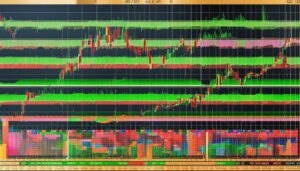The forex market can be complex for beginners, with various terms and concepts to understand. One such concept is forex spreads. In this beginner’s guide, I will explain what forex spreads are and why they are important in forex trading.
Forex, also known as FX, involves trading national currencies against one another. It is the largest and most liquid market globally, with numerous participants, including banks, governments, central banks, brokers, institutions, and individual traders.
A spread in forex refers to the difference between the bid price and ask price of a currency pair. Essentially, it represents the cost of each transaction charged by the forex broker. Understanding spreads is crucial for beginner traders, as it directly impacts trading costs and potential profits.
Key Takeaways:
- Forex spreads are the difference between the bid and ask price of a currency pair.
- Spreads reflect the cost of each transaction charged by the forex broker.
- Understanding spreads is important for managing trading costs and profitability.
- Forex spreads vary depending on currency pairs, market volatility, and liquidity.
- Traders can choose between fixed spreads and variable spreads offered by forex brokers.
What is a Spread in Forex?
In forex, a spread is made up of two prices: the bid price (the buying price) and the asking price (the selling price). The bid price is what a forex broker is prepared to pay for a currency, while the asking price is the rate at which a forex broker will sell the same currency. The spread is the difference between these two prices and serves as the basic remuneration for the broker. It represents the supply and demand for currencies, with the bid price indicating supply and the ask price showing demand.
Currency pairs consist of a base currency and a quote currency. The quotation specifies the amount of the quoted currency required to buy one unit of the base currency.
How to Calculate the Spread in Forex?
In forex trading, understanding how to calculate the spread is essential for assessing trading costs and making informed decisions. The spread is the difference between the bid price and the ask price for a currency pair. By calculating the spread, traders can determine the cost of each transaction and evaluate if it aligns with their trading style and strategies.
To calculate the spread, follow these simple steps:
- Identify the bid price and ask price for the currency pair you are trading.
- Subtract the ask price from the bid price.
Most currency pairs are quoted to the fourth decimal place, and the last decimal represents a pip. A pip is the smallest unit of measurement in forex trading and represents the smallest price movement. By calculating the spread in pips, traders can precisely assess the cost of each transaction.
Let’s illustrate with an example:
If the bid price for EUR/USD is 1.0931 and the ask price is 1.0934, the spread is 3 pips.
Calculating the spread in pips helps traders gauge the transaction cost and determine if it is favorable for their trading strategy. By being aware of the spread, traders can make informed decisions and manage their trading expenses effectively.
The image above visually represents the calculation of the spread in forex.
Importance of Spreads in Forex Trading
Forex spreads play a crucial role in trading as they impact the costs and profitability of trades. As a trader, understanding the significance of spreads is essential for making informed decisions and maximizing returns.
Traders with lower spreads have a distinct advantage, as they benefit from lower operational expenses. By minimizing transaction costs, these traders can save more in the long run and increase their profitability. On the other hand, higher spreads require traders to make larger profits in order to cover the cost. This poses a greater challenge, as it demands higher returns to offset the initial loss.
It’s important to note that the spread represents the difference between the buying and selling price of a currency pair and serves as the commission charged by the broker. Therefore, considering the spread before entering a trade is crucial since it determines the minimum profit required to offset the trading cost.
For example, let’s say the spread for a particular currency pair is 3 pips. In order to cover this cost, a trader needs to generate a profit of at least 3 pips during the trade. Any profit below the spread wouldn’t be sufficient to offset the incurred trading cost.
Furthermore, in order to navigate the forex market successfully, it is imperative for traders to select a reputable broker that does not manipulate spreads. A reliable broker will provide fair and transparent pricing, ensuring that traders can execute trades at competitive rates.
The importance of spreads in forex trading cannot be overstated. By minimizing trading costs and carefully considering the spread, traders can enhance their overall profitability and optimize their trading strategies.
Example Table – Spread Comparison
| Currency Pair | Broker A | Broker B | Broker C |
|---|---|---|---|
| EUR/USD | 1.2 pips | 1.4 pips | 1.8 pips |
| GBP/USD | 1.5 pips | 1.7 pips | 2.0 pips |
| AUD/JPY | 0.8 pips | 1.2 pips | 1.5 pips |
The table above provides a comparison of spreads offered by different brokers for selected currency pairs. Traders can use this information to determine which broker offers the most favorable spreads for their preferred currency pairs, thereby minimizing trading costs.
Factors Influencing Spreads in Forex Trading
In forex trading, spreads are influenced by various factors that traders need to consider. These factors include the currency pair being traded, market volatility levels, liquidity, and economic events or news.
Currency Pair: The choice of currency pair plays a significant role in determining the spread. Major currency pairs, such as EUR/USD or GBP/USD, tend to have tighter spreads compared to exotic or emerging market currency pairs. This is because major currency pairs have high trading volumes and are more liquid, leading to narrower spreads.
Market Volatility: Spreads are also impacted by market volatility levels. Higher volatility in the market leads to wider spreads as brokers adjust the spreads to compensate for the increased risk. During periods of high volatility, such as major economic announcements or geopolitical events, spreads can widen significantly.
Liquidity: Liquidity in the forex market is another factor that influences spreads. Higher liquidity means that there are more buyers and sellers in the market, resulting in narrower spreads. Conversely, lower liquidity can lead to wider spreads as there may be fewer participants willing to trade at a given price.
Economic Events and News: Economic events and news releases can cause spreads to widen, particularly during periods of high volatility. When significant economic data or news is released, market participants may increase their trading activity, leading to higher spreads. Traders need to be aware of these events and consider the potential impact on spreads when developing their trading strategies.
“The currency pair, market volatility, liquidity, and economic events all play a role in determining the spreads in forex trading. Traders must understand and analyze these factors to make informed trading decisions.”
By considering these factors, traders can gain a better understanding of the spreads in forex trading and develop strategies to effectively navigate the market.
Next, let’s explore the different types of spreads in forex trading.
Types of Spreads in Forex Trading
Forex brokers offer different types of spreads to cater to the diverse needs of traders. The two most commonly offered spreads are fixed spreads and variable spreads.
Fixed Spreads
Fixed spreads, as the name suggests, remain constant regardless of market conditions. They are typically set for the most liquid currency pairs, such as EUR/USD, USD/JPY, and GBP/USD. With fixed spreads, traders always know the exact cost of each transaction, providing more predictability in terms of transaction costs.
One advantage of fixed spreads is that they generally require smaller capital requirements compared to variable spreads. This can be beneficial for traders with limited funds or those who prefer to have more control over their trading costs. However, it’s important to note that fixed spreads can come with a potential downside: more frequent requotes.
A requote occurs when the broker is unable to execute a trade at the requested price and provides an alternative price instead. As fixed spreads do not adjust to market conditions, they may result in more requotes, especially during high volatility.
Variable Spreads
Variable spreads, on the other hand, fluctuate based on market conditions and the currency value. These spreads offer more transparency and better pricing as they reflect the supply and demand dynamics in the forex market. Variable spreads tend to be tighter during periods of high liquidity, such as the overlap between the European and US trading sessions.
While variable spreads provide better pricing and no requotes, they come with increased trading risks, particularly during times of high market volatility. Traders need to carefully assess their risk tolerance and adapt their strategies accordingly when trading with variable spreads.
Here’s a brief comparison of the pros and cons of each spread type:
| Spread Type | Pros | Cons |
|---|---|---|
| Fixed Spreads | Smaller capital requirements More predictable transaction costs |
Potential for more frequent requotes |
| Variable Spreads | No requotes More transparency |
Increased trading risks during high volatility |
When selecting a forex broker and shaping their trading strategies, traders need to consider the pros and cons of each spread type. It is essential to find a balance between trading costs, pricing transparency, and risk tolerance to optimize their trading experience.
Conclusion
Managing spread costs is a critical aspect of forex trading strategies that can significantly impact the profitability of trades. As a beginner trader, it is crucial to understand forex spreads and implement effective techniques to minimize costs.
One strategy for managing spread costs is to focus on currency pairs with lower spreads. By choosing pairs that have tighter spreads, traders can reduce the initial transaction cost and increase the potential profits.
Additionally, considering the time of day for trading can play a role in managing spread costs. During periods of high market volatility, spreads tend to widen. Therefore, by trading during times of lower volatility, traders can avoid wider spreads and potentially reduce trading costs.
Furthermore, using limit orders can be a valuable tool in managing spread costs. Limit orders allow traders to specify the maximum price they are willing to pay or the minimum price they are willing to sell at. By setting these predetermined conditions, traders can avoid unfavorable spreads and execute trades at desired levels.
When choosing a forex broker, it is essential to consider more than just the spread costs. Factors such as trading platforms, customer support, and regulatory compliance should also be taken into account. TD Ameritrade, for example, offers competitive spreads, but traders should assess their overall suitability and compatibility with their trading goals.
By understanding and effectively managing spreads, traders can enhance their trading experience in the forex market and strive for greater profitability.
FAQ
What is a forex spread?
A forex spread is the difference between the bid price and the ask price of a currency pair. It represents the cost of each transaction charged by the forex broker.
How is the spread calculated in forex?
The forex spread is calculated by subtracting the ask price from the bid price. Most currency pairs are quoted to the fourth decimal place, and the last digit is called a pip.
Why are spreads important in forex trading?
Spreads impact the costs and profitability of trades. Traders with lower spreads have lower operational expenses and can save more in the long run.
What factors influence spreads in forex trading?
The currency pair involved, market volatility levels, liquidity, and economic events can all influence spreads in forex trading.
What are the types of spreads in forex trading?
Forex brokers offer fixed spreads that remain constant regardless of market conditions and variable spreads that fluctuate based on market conditions.
How can I manage spread costs in forex trading?
Traders can manage spread costs by focusing on currency pairs with lower spreads, considering the time of day for trading, and using limit orders to avoid wider spreads during volatile market conditions.
Source Links
- https://www.investopedia.com/ask/answers/06/forexpercentagespread.asp
- https://www.linkedin.com/pulse/what-spread-forex-beginners-guide-dr-william-odion
- https://www.forex.academy/understanding-td-ameritrade-forex-spreads-a-beginners-guide/?amp=1
Disclaimer
All information on this website is of a general nature. The information is not adapted to conditions that are specific to your person or entity. The information provided can not be considered as personal, professional or legal advice or investment advice to the user.
This website and all information is intended for educational purposes only and does not give financial advice. Signal Mastermind Signals is not a service to provide legal and financial advice; any information provided here is only the personal opinion of the author (not advice or financial advice in any sense, and in the sense of any act, ordinance or law of any country) and must not be used for financial activities. Signal Mastermind Signals does not offer, operate or provide financial, brokerage, commercial or investment services and is not a financial advisor. Rather, Signal Mastermind Signals is an educational site and a platform for exchanging Forex information. Whenever information is disclosed, whether express or implied, about profit or revenue, it is not a guarantee. No method or trading system ensures that it will generate a profit, so always remember that trade can lead to a loss. Trading responsibility, whether resulting in profits or losses, is yours and you must agree not to hold Signal Mastermind Signals or other information providers that are responsible in any way whatsoever. The use of the system means that the user accepts Disclaimer and Terms of Use.
Signal Mastermind Signals is not represented as a registered investment consultant or brokerage dealer nor offers to buy or sell any of the financial instruments mentioned in the service offered.
While Signal Mastermind Signals believes that the content provided is accurate, there are no explicit or implied warranties of accuracy. The information provided is believed to be reliable; Signal Mastermind Signals does not guarantee the accuracy or completeness of the information provided. Third parties refer to Signal Mastermind Signals to provide technology and information if a third party fails, and then there is a risk that the information may be delayed or not delivered at all.
All information and comments contained on this website, including but not limited to, opinions, analyzes, news, prices, research, and general, do not constitute investment advice or an invitation to buy or sell any type of instrument. Signal Mastermind Signals assumes no responsibility for any loss or damage that may result, directly or indirectly, from the use or dependence on such information.
All information contained on this web site is a personal opinion or belief of the author. None of these data is a recommendation or financial advice in any sense, also within the meaning of any commercial act or law. Writers, publishers and affiliates of Signal Mastermind Signals are not responsible for your trading in any way.
The information and opinions contained in the site are provided for information only and for educational reasons, should never be considered as direct or indirect advice to open a trading account and / or invest money in Forex trading with any Forex company . Signal Mastermind Signals assumes no responsibility for any decisions taken by the user to create a merchant account with any of the brokers listed on this website. Anyone who decides to set up a trading account or use the services, free of charge or paid, to any of the Broker companies mentioned on this website, bears full responsibility for their actions.
Any institution that offers a service and is listed on this website, including forex brokers, financial companies and other institutions, is present only for informational purposes. All ratings, ratings, banners, reviews, or other information found for any of the above-mentioned institutions are provided in a strictly objective manner and according to the best possible reflection of the materials on the official website of the company.
Forex/CFD trading is potentially high risk and may not be suitable for all investors. The high level of leverage can work both for and against traders. Before each Forex/CFD investment, you should carefully consider your goals, past experience and risk level. The opinions and data contained on this site should not be considered as suggestions or advice for the sale or purchase of currency or other instruments. Past results do not show or guarantee future results.
Neither Signal Mastermind Signals nor its affiliates ensure the accuracy of the content provided on this Site. You explicitly agree that viewing, visiting or using this website is at your own risk.




